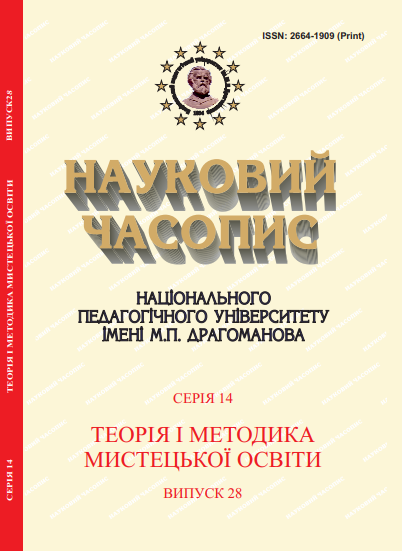Online distance education of future music teachers: modern challenges
DOI:
https://doi.org/10.31392/NPU-nc.series14.2022.28.11Keywords:
music education, musical abilities, professional training, media technologies, computer technologies, distance learningAbstract
The article is devoted to an important problem today - the organization and implementation of music education in online conditions. The phenomena of "media technology", "computer technology" in a pedagogical retrospective are considered. The main types and varieties of media technologies are highlighted and their features are characterized. Distinguishing features and capabilities of modern computer and media technologies are studied. It is noted that for the organization of a high-quality distance learning process of music, it is not the computer or media technology itself that is important, but the extent to which its use ensures the achievement of educational goals and objectives.
The main vectors of learning with the help of computer and media technologies, which are dynamically developing in the Ukrainian educational space, are outlined: active use of services and educational portals in the practice of teaching children, pupils, students, adults; use of digital (electronic) libraries; formation of technological and media literacy; distance learning in educational institutions of all levels; discussions in classes (groups) by hash-tags; using the computer as a tool for listening, creating and arranging music; application of the technical capabilities of the computer and gadgets (camera, video camera, voice recorder, player, multimedia editor) as a tool for creating educational media content.
The positive experience of using free online platforms, services, applications, auxiliary programs, multimedia editors for creating educational content for teaching music is presented. Types of interactive, musical-creative tasks for the development of musical abilities, musical thinking, and improvement of vocal and technical-performance skills of future music teachers are outlined.
It is noted that the era of information technologies in which we live forces us to be actively involved in the training of creative innovative teachers who are able not only to skillfully use the accumulated pedagogical experience, but also to actively and creatively enrich it with new knowledge and values, by introducing into the process of teaching music innovative computer and media technologies.
References
Балєва О. (2014) Інформаційно-комунікаційні технології на уроках музики. Кривий Ріг. 29 с.
Барановська І.Г., Мозгальова Н.Г., Барановський Д.М. Бордюк О.М. (2021) Використання засобів ІКТ у процесі дистанційного навчання майбутніх учителів музичного мистецтва. Наукові записки : збірник наукових статей. Київ : Вид-во НПУ імені М. П. Драгоманова. Випуск СL (150). С. 21-37. URL: http://enpuir.npu.edu.ua/handle/123456789/35295
Барановська І.Г, Мозгальова Н.Г. (2021) Медіаграмотність – життєво необхідна компетентність майбутніх учителів ХХІ століття. Інформаційні технології: наука, техніка, технологія, освіта, здоров’я: тези доповідей ХXVІІІ міжнародної науково-практичної конференції MicroCAD-2020. С.28-30
Гуревич Р.С. (2005) Інформаційно-телекомунікаційні технології в
навчальному процесі та наукових дослідженнях : навчальний посібник Київ-Вінниця : ТОВ Планер. 366 с.
Дем’янчук О.Н., Саварин П.В. (2016) Застосування медіа-технологій викладачами технічних дисциплін у професійній діяльності: навчальний посібник. Луцьк: Ред.-вид. Відділ Луцького НТУ. 204с
Дичківська І.М. (2012) Інноваційні педагогічні технології : підручник Київ : Академвидав. 352 с.
Драйден Ґ. Революція в навчанні (2011) Львів : Літопис. 544 с.
Короткий словник-довідник медіа-термінів (2017). Криве Озеро: РМНЦ відділу освіти Кривозерської райдержадміністрації. 2017. 28 с. URL: https://naurok.com.ua/korotkiy-slovnik-dovidnik-media-terminiv-11828.html.
Іванов В.Ф., Волошенюк О.В. (2012) Медіа-освіта і медіа-грамотність : підручник. Київ : Центр вільної преси. 352 с
Медіа. URL: https://uk.wikipedia.org/wiki/М
Недбай В. Еволюція розвитку медіа-технологій : від первісного – до інформаційного суспільства. URL: http://social-science.com.ua/article/58.
Мільто Л.О. (1999) Гуманістична модель особистісно-зорієнтованих технологій. Творча особистість вчителя: проблеми теорії і практики. К. Вип. 3. С. 55–60.
Потятиник Б.В. (2004) Медіа: ключі до розуміння. Львів : ПАІС, 2004. 312 с.
Череповська Н. (2010) Медіа-культура та медіа-освіта студентів ЗОШ: візуальна медіа-культура. Київ : Шкільний світ. 128 с
Словник – Медіа ІQ. URL: http://media-iq.tilda.ws/glossary
Іnnovating Pedagogy (2014) URL: http://www.openeducationeuropa.eu/sites/default/files/news/
Instructional Technology and Media for Learning / S. Smaldino, D. Lowther, J. Russell, J. Mims. New Jersey : PEARSON, 2014. 280 p.
Jensen K. B. (2013). How to do things with data: Meta-data, meta-media, and meta-communication. First Monday, 18(10). Retrieved from http://firstmonday.org/ojs/index.php/fm/article/view/4870/375
Lievrouw L. (2014). Materiality and media in communication and technology studies: An unfinished project. In T. Gillespie, P. Boczkowski, & K. Foot (Eds.), Media technologies: Essays on communication, materiality and society (pp. 21–52). Cambridge, MA: MIT Press.
Mozgalova, N. G., Baranovska, I. G., Hlazunova, I. K., Mikhalishen, A. V., & Kazmirchuk,N. S. (2021) Methodological foundations of soft skills of musical art teachers in pedagogical institutions of higher education. Linguistics and Culture Review 5(S2), 317- 327. URL: https://doi.org/10.37028/lingcure.v5nS2.1355
Downloads
Published
Issue
Section
License
Copyright (c) 2022 Nauk. čas. Nac. pedagogìčnogo unìv. ìm. M.P. Dragomanova, Ser. 14, Teor. metod. mistec. osv. [Scientific journal NPDU. Series 14. Theory and methodology of arts education]

This work is licensed under a Creative Commons Attribution-NonCommercial-ShareAlike 4.0 International License.

